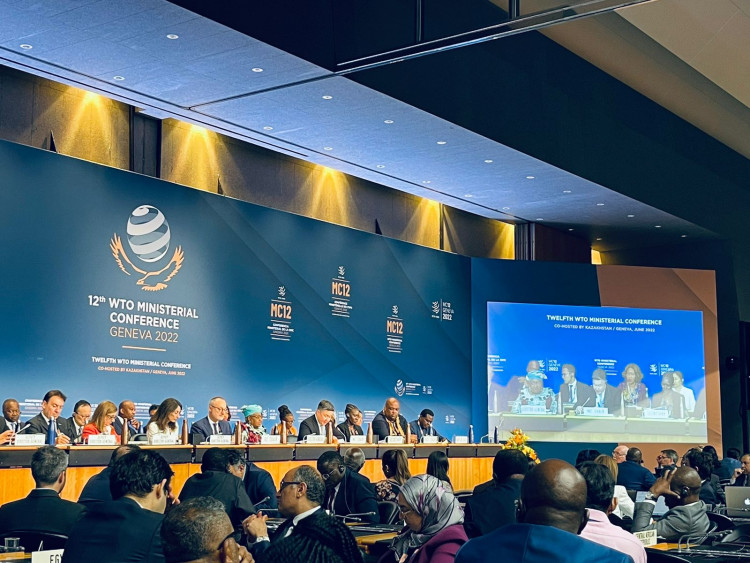NUR-SULTAN – The 12th Ministerial Conference (MC-12) of the World Trade Organization (WTO) chaired by Kazakhstan concluded on June 17 with the adoption of major decisions on fisheries, food security, the fight against COVID-19, and electronic commerce, reports the presidential press service.

One of the conference’s sessions. Photo credit: Akorda
Kazakhstan, which has been a WTO member since November 2015, co-hosted the conference and Timur Suleimenov, deputy chief of the presidential staff, chaired it. The country was supposed to host the conference in June of 2020 but it was postponed due to the COVID-19 pandemic.
After several days of intense discussions, trade ministers from 164 WTO member countries adopted a landmark agreement to prohibit subsidies that contribute to illegal, unreported, and unregulated fishing. This agreement seeks to limit overfishing to preserve the livelihoods of communities that depend on fisheries for food security and jobs.
A dedicated trust fund to provide technical assistance and capacity building for developing countries to implement the agreement was also announced.
This is the first time that the WTO has established a multilateral agreement to support sustainability and protect the oceans and fish stocks. Under international law, it will now be illegal to subsidize vessels involved in illegal and unregulated fishing and subsidize fishing in unregulated areas of the high seas.
The ministers also agreed to allow limited intellectual property rights to produce safe and effective vaccines and expand the supply of vaccines to developing and least developed countries, a big move to ensure fair access and equitable global distribution of vaccines, which is crucial in the fight against the COVID-19.
To provide food to poor countries in light of rising food prices, the ministers decided to remove export bans or restrictions on humanitarian purchases provided by the United Nations World Food Programme. They adopted a declaration on food security, reaffirming the importance of avoiding export restrictions on food.
Recognizing the importance of developing digital services and products, especially during the pandemic and economic recovery, the conference agreed to continue the implementation of the working program on electronic commerce and extend the moratorium on customs duties on electronic transactions until the next WTO Ministerial Conference, a critical win for the digital economy.
The decision relies on numerous studies that indicate the economic benefits of the e-commerce moratorium, particularly beneficial for developing and least-developed countries, and for large and small enterprises.
Kazakhstan’s successful chairpersonship was facilitated by regular high-level dialogue. President Kassym-Jomart Tokayev has repeatedly stressed the strategic importance of the cooperation between Kazakhstan and the WTO and the country’s readiness to contribute to the settlement of all issues on the WTO negotiation agenda.
WTO Director-General Ngozi Okonjo-Iweala praised Kazakhstan’s chairpersonship and expressed appreciation to the leadership and government of Kazakhstan for the cooperation in preparation for the conference and for flexibility in overcoming challenges, including its relocation from Nur-Sultan to Geneva due to the pandemic.
In her closing remarks at the conference, she emphasized that trade is part of the solution to today’s crises, and the package of agreements reached demonstrated the ability of WTO member countries to come together to bridge geopolitical divides, respond to global challenges, address environmental issues and promote greater social and economic integration.

